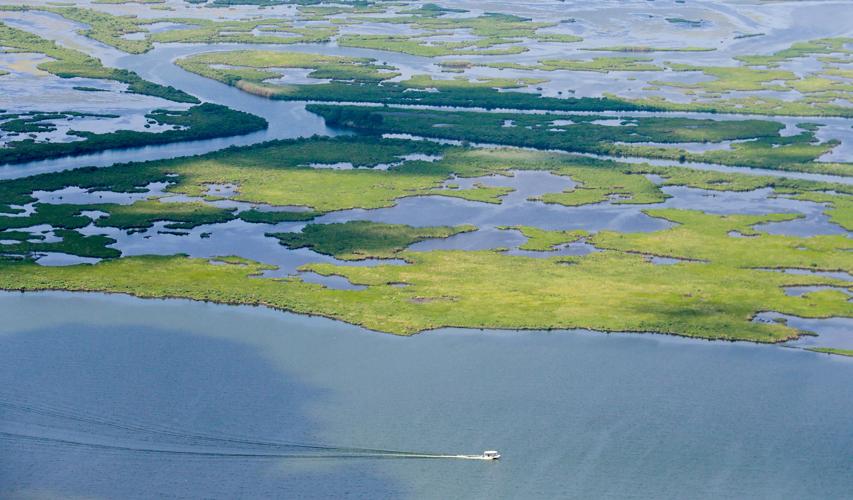A landmark settlement with an oil and gas company that could potentially begin to unlock billions of dollars to help restore Louisiana’s disappearing coast has yet to advance, three months after a tentative agreement was announced.
John Carmouche, a Baton Rouge-based attorney who negotiated the deal with Freeport-McMoRan Inc., said he has yet to submit the proposed settlement to the 12 coastal parishes that must approve it. In September, he had said that he expected all 12 would approve the deal by year's end.
He blamed the delay on elections last year in several of the parishes, which meant he has to explain the deal to several new officials, and a need to fine-tune the deal’s wording.
He now expects the parishes to approve the settlement by February.
“We don’t see any problems or hiccups in the process,” he said in an interview.

John H. Carmouche, an attorney, is flanked by photos and a map of Louisiana's Coastal Zone Wednesday Sept. 25, 2019, in Baton Rouge, La.
Carmouche believes the settlement with Freeport will lead to similar deals with other companies that want to resolve lawsuits that put the blame for pollution and the loss of coastal wetlands on their oil and gas drilling activities years ago.
Gov. John Bel Edwards and several coastal parish leaders have praised the deal in concept.
Lobbyists for oil and gas companies have denounced the lawsuits and the Freeport settlement, saying they are part of a massive shakedown by trial attorneys. They have also claimed that lawsuits filed by Carmouche on behalf of coastal parishes have chilled investment by energy companies.
Eddie Rispone, the Republican gubernatorial candidate in last fall’s elections, had promised to squelch such lawsuits if elected. While Rispone lost the election, powerful business interests in Baton Rouge are likely to push for restrictions on such lawsuits this year at the Legislature.
Under the proposed Freeport deal, a judge would decide how much money the Carmouche law firm would receive. The firm is not working on a contingency basis.
Potentially billions of dollars are at stake with the lawsuits, which involve some huge companies and large swaths of land, The Carmouche law firm has sued 98 different firms in 42 different cases.
None of the cases have gone to trial yet, as lawyers from both sides wrangle over whether they will be heard in state or federal court. Carmouche favors the former, while the oil and gas companies favor the latter.
The deal with Freeport calls for the company to pay up to $100 million in cash and what Carmouche calls “environmental credits.” The money would be paid over an estimated 22 years and placed in a state fund dedicated to coastal restoration. The 12 parishes would divide $23.5 million in cash and up to $76.5 million generated by selling environmental credits to other companies looking for environmental offsets for projects.
How exactly this process would work is not clear. Nor is it certain that the promised money in future years would actually materialize.
In first for energy industry, Freeport-McMoRan to settle Louisiana lawsuits aimed at restoring coast
The Carmouche firm represents six parishes: Jefferson, Plaquemines, St. Bernard, St. John, Vermilion and Cameron.
Carmouche said another six coastal parishes would be part of the deal because they have prepared a damage model in case there is a settlement. Those parishes are: Lafourche, Terrebonne, St. Charles, St. Mary, St. Martin and Iberia.
In the meantime, local officials are in the dark.
“I’m not sure what’s going on,” said Benny Rousselle, a member of the Plaquemines Parish Council who has supported the lawsuits. He added: “I told the lawyers that I want to see a fair and equitable portion for Plaquemines because we’ve been instrumental in leading the charge.”
Navigating that distribution is one of the challenges facing Carmouche.
He said that how much each parish would receive will depend on “how much land loss is real and provable damage caused by the oil industry and how much contamination was caused by the oil industry.”
Another tricky issue: In some parishes, Carmouche is dealing with the parish council or police jury that has authority over the lawsuits. In other parishes, jurisdiction lies with the district attorney. All 12 parishes have to ratify the settlement for it to go into effect.
Another challenge is that a competing law firm — New Orleans-based Jones, Swanson, Huddell & Garrison — represents Bofill Duhe, the district attorney for St. Mary, St. Martin and Iberia parishes.
In an interview, Duhe said he hasn’t seen the details of the Freeport settlement, adding that he hired Jones Swanson because he wasn’t familiar with the relevant area of law.
Carmouche also must get the Legislature to pass legislation that would create a structure to receive the funds from Freeport and other oil and gas companies that might settle, to fulfill the stipulation in the agreement that the money will go for coastal restoration. The Legislature convenes on March 9, which means that Carmouche is beginning to run out of time for legislation to be introduced this year.
Undergirding the lawsuits is the grim fact that Louisiana has lost 1,900 square miles of coastline since 1930, an area bigger than Rhode Island.
The state's Coastal Master Plan calls for spending $50 billion over 50 years, with half the money to be spent on coastal restoration. However, only about $10 billion — mostly BP oil spill-related money — has been identified for restoration projects so far. The general public has shown no appetite for paying higher taxes to restore the coast.






